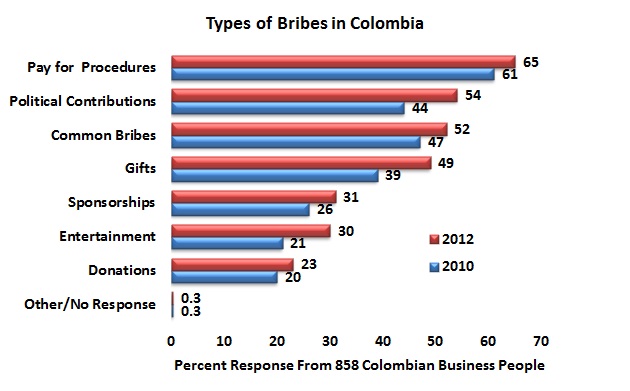We find the USO’s embracing of environmentalism incredibly cynical but they have seized on this as a way to connect with the broader public and justify their strategies. Ecopetrol understands this and so we have a recent detailing of their environmental investments. Pacific Rubiales also highlights its environmental record, but principally it seems for ethical investors.
As reported by Semana, Ecopetrol has decided to remove control of the Colorada field (located in San Vicente de Chucuri, Santander) from the Universidad Industrial de Santander (UIS), which the company had given to the university in 2006 for training its students until 2016. At the time, the field was producing 14bd but it has been estimated that it could produce as much as 3,500bd.
Business magazine Dinero reports that 500 truckers threatened to go on strike and, to avoid it, asked companies like Ecopetrol and Pacific Oil Tech help them to find a solution to the problems that left them paralyzed in the Cartagena free trade zone, fact that made them lose about US$800 a day per truck.

The annual report of this prestigious organization reveals an increasing perception that bribery is a taking place in Colombian business. The graph above shows the frequency of response for various types of bribery comparing 2012 responses to 2010. Uniformly, 2012 responses are higher than 2010 indicating the perception of corruption has worsened. More concerning, and more easily addressed is the result that, despite this increased perception, Colombian businesses seem to take few steps to mitigate such practices. From the Transparency Colombia press release, translated and with commentary by Hydrocarbons Colombia.
While it may seem that the USO’s campaign to discredit the mining and energy industries is self-destructive, one must keep in mind that their goal is not to close the industry but to force multinationals to leave. They want to go back to the days when Ecopetrol ran everything and thus 100% of the jobs were USO jobs. Terpel workers settle for about 4% (which is only slightly over the inflation rate) and Cartagena refinery workers vote to go on strike. If the union manages to stop construction as well, that will delay the Cartagena refinery upgrades even more than they have been.
Ecopetrol continues its publicity campaign about local employment and procurement. This time it is the turn of employment, highlighting how many jobs the company creates and how many are filled with local people. With local hiring being a developing community issue, this Ecopetrol press release is timely. Translated and with commentary by Hydrocarbons Colombia.
Business magazine Dinero reports that the government and thirteen mining companies in the country (among them Cerromatoso, Paz del Río, Anglo Gold Colombia, Drummond, Carbones del Cerrejón, Anglo Gold Ashanti, Grancolombia Gold and Prodeco) signed an agreement to fight against poverty in their areas of influence. The companies pledged to work with 3,521 families from the Red Unidos in 30 municipalities.
Ecopetrol has invested in the Ventures contest which encourages entrepreneurship and innovation. The contest spans a wide range of economic activities but Ecopetrol has chosen to invest in the Education and Culture component for the past two years. The connection with the oil and gas is secondary but the cause is worthy. From an Ecopetrol press release, translated and with commentary by Hydrocarbons Colombia.
This Ecopetrol press release details the company’s local procurement activities by region. Local procurement has become an issue because the communities in which oil and gas companies operate have lost line of sight to the benefits having hydrocarbons activity in the vicinity. The costs – like roads clogged with tanker trucks – are readily apparent but since the reform of the royalties distribution system, only local procurement is a sure route to jobs. Translated and with commentary by Hydrocarbons Colombia.
The USO news this week is heavy on discontent at refineries with Cartagena refinery determining a strike date and Apiay refinery workers worried about losing their jobs. Ecopetrol plans to close the Apiay facility because of low productivity but workers accuse management of the problems. More workers in Meta face an uncertain future after Incoequipos, an oil services subcontractor closed its doors.